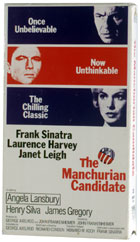Unpublished letter to the editor, The New Yorker, in response to Louis Menand’s “Brainwashed: Where the ‘Manchurian Candidate’ came from."
September
12, 2003
To the editor, The New Yorker
In his essay “Brainwashed:
Where the ‘Manchurian Candidate’ came from” Louis
Menand suggests that the charge made by brainwashed American pilots that
the US had engaged in germ warfare during the Korean War was “untrue
but widely believed in many countries.” Menand implies that this
controversial issue is far more settled than is in fact the case.
A new documentary film, “Code Name Artichoke” (produced this
year by German public television and widely shown internationally and
in the US on WorldLink TV) on the death of my father, Dr. Frank Olson,
revisits this question and presents new evidence. (See this link for a
transcript
of the film.)
In the year before his death in 1953 my father, a biochemist, was acting
chief of the Special Operations Division (essentially an off-campus CIA
BW lab) at the Army's center for biological warfare at Camp Detrick, Maryland.
This position put him on the boundary between biological warfare and interrogation
research, precisely the strange boundary zone evoked in the term “germ
warfare confessions.” The conventional wisdom alleges that in November
1953 he threw himself out of a 13th floor window of the Statler Hotel
in New York (now the Hotel Pennsylvania) after having himself been drugged
with LSD by the CIA in a mind control experiment. This version of events
comprises the core chapter of John Marks’ 1979 book, The
Search for the Manchurian Candidate.
(Times Books)
“Code Name Artichoke” shows that my father became convinced
that the US was using biological weapons in Korea, at least on an experimental
basis. The film juxtaposes footage of an American pilot making these claims
with footage in which this same serviceman subsequently recants his “germ
warfare confession.” The question as to which of these statements
is the product of indoctrination is thereby starkly posed, with the implication
that the notion of brainwashing was, among other things, a powerful tool
for psychological discrediting.
Sincerely,
Eric Olson, PhD
Visual connections between “The Manchurian Candidate” and the Frank Olson story.
See also the statment by Stephen Endicott and Ned Hagerman on the connections between the Frank Olson story and allegations of use of biological weapons in the Korean War.

